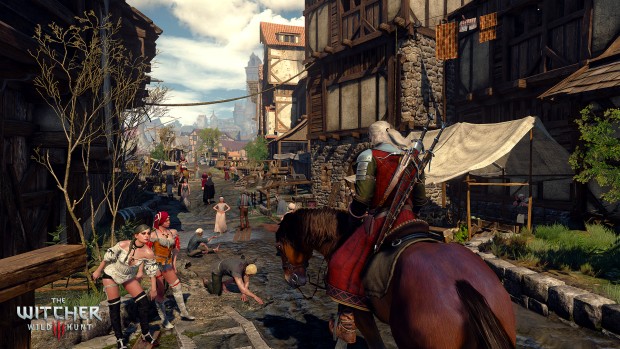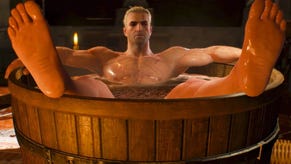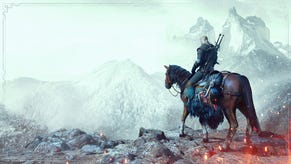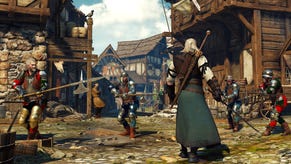I'm A Lover, Not A Fighter: 3 Hours With The Witcher 3
I was travelling into the forest with a hunter who had seen a griffin slay dozens of men and women. The ground was still puddled with blood from its most recent massacre, but it was another act of violence that drew my attention. In conversation, the hunter revealed that he was chased from his village because his neighbors discovered that he was gay. Now he lives by himself, away from the judging eyes of his peers. Despite being forced from society, he still helps bring an end to the griffin, to relieve those who shunned him of further suffering.
"Even though it's a fantasy game, we want to make sure that it feels real," said Jonas Mattsson, senior environmental artist at CD Projekt Red. Reaching that goal begins with how people are presented in The Witcher 3: Wild Hunt (official site), the first three hours of which I've now played.
For example, an army has conquered the villages and countryside, killing many of the locals who worked to build a life for themselves. When you meet the new ruler, he's explaining the payment he expects from the people who now live under him. Such a scene could star a mustachioed villain taking pleasure in others misfortune, but that's not the case here. He shows kindness toward his serfs, demands less in taxes than expected, and that small subversion creates a character who is multifaceted, an understanding imperialist.
“If everyone was pure good or evil, it wouldn't be real. To me, it wouldn't be interesting,” said Mattsson. That ambiguous approach is key also in how Geralt, the hero of this story, is presented. There isn't a sliding morality scale to contend with in The Witcher 3, with goodie and baddie points to collect; rather, you make your choices, and deal with whatever repercussions may surface down the line. “We revel in this gray. We love to challenge the player,” Mattsson said. The effect in practice is that, without evil and pure choices, I hesitated before every decision. Does my Geralt accept payment from a man he doesn't respect? Does he fight local drunks looking for action? Will I regret drawing my sword or should I give in to temptation?
Though I only played three hours, The Witcher 3 seems to be walking a fine line in its efforts to depict a more believable reality. The game opens with Geralt lying in a bath, legs splayed, enjoying not doing any of his morning chores. Beside him sits the sorceress Yennifer, naked in a chair, teasing him for being so lazy. It's a scene that some people might see as pandering, particularly given the series previous form in this area, but it didn't seem that way to me. Instead, I found it sweet and playful. There's a happy back-and-forth between Geralt and Yennifer that made me smile, and so much of who these people are is communicated in that simple moment.
“Nudity is beautiful, it's natural. And sex is natural. There's nothing wrong with it, and that's the approach we have,” Mattsson said. That sounds fine, but we've seen video games with that attitude go down troubling paths before. I hope The Witcher 3 continues to walk its fine line successfully. I've seen nothing but respect for the women I encountered. Yennifer is more than Geralt's match, she's his better in many ways, and she uses her own strength and intelligence to get what she believes is hers.
Mattsson goes further. “I find Yennifer amazing. If she existed in real life, well, thank god I'm married... but she's an amazing woman. She's so strong, so confident, and she does what she wants,” he said.
On the surface, The Witcher 3 is brazen and unafraid to offend, but during my playtime, it rose above tropes and created people who were more than caricatures. This is true even in the minor characters I met. The hunter who accompanied me on my search for the griffin is more than just a stand-in. He's wise in the ways of wildlife, believes dogs are even more heinous that wolves, and is an open book to those who show interest. Soon after my encounter with the hunter, I met a herbalist whose story was just as rich. Geralt finds friends in The Witcher 3 just by listening to what's on people's minds, and everyone seems to have their own quirks, personalities, and motivations, making me want to talk to them all.
Of course, not everyone is meant to be your friend. “We're confident in what we're doing, in how we portray the everyday life that's happening in The Witcher,” Mattsson said. And if you're trying to be faithful to reality, there needs to be some spoiled eggs. “Is this world worth saving?” Mattsson asked. “These people you meet, they're so corrupt sometimes, that I don't know if I want to.” It's a question you'll have to answer as Geralt, too. Some times you play the hero, and sometimes you just continue on your way.
In my three hours with the game, I spoke to everyone that I met while I rode my horse through the idyllic world. It's a beautiful game, and I felt enriched every time I entered into another discussion. But there's more than just galloping around on a horseback while solving people's problems. There's combat, too, lots of it, and that's where my interest waned.
The Witcher 3's fights are mighty similar to those found in its predecessor. Use your sword up close, draw sigils to cast magic, and learn to parry or pay the price with your life. For those like me who found The Witcher 2 uncomfortably difficult in the early going (and I've finished Dark Souls without breaking a sweat or a controller), you'll be relieved that the latest entry is toned down. Sure, there's a challenge if you're hankering for pain, but for those who want to enjoy the scenery and story, you can progress to the more thoughtful aspects without too much standing in your way.
But if the nicest thing I can say about the combat is that it's more accessible, well, that isn't so hot. The fights felt more like distractions from what I wanted to do rather than exciting forays in their own right. It lacks the thrill of the unknown that dominates Dragon's Dogma or the steely determination demanded by Dark Souls. It's much closer to the feel of a game like Skyrim, giving you something to do in this incredible world other than talk to people and look at the scenery.
That's not to say the combat is bad, just bland. When I entered into the climatic fight with the griffin, a battle that had been looming for a solid hour, I was saddened that my heart didn't race once during this deadly showdown. The beast would fly into the air while I shot my crossbow at its backside and then crash down to earth with violence on its mind. I experimented a little, using one sigil to stun it, another to set a trap around it, and I died plenty as I figured out the best way to success, but the fight never grabbed my attention. When I finally triumphed, it was with relief rather than joy, as I happily set out to listen to people's reactions to my conquest.
Talking to Mattsson after I played the demonstration made me wonder if I had missed something. “Our monsters don't scale. You wander in the wrong neighborhood, you get ripped apart by a cyclops." That certainly sounds great - who doesn't want to be ripped apart by a cyclops? But the combat didn't click for me.
The Witcher 3 is a setting that I want to explore, and it begins with characters who are more than soulless puppets. Maybe when I play the finished game come May, I'll turn my Geralt into a pacifist who does nothing but chatter with the locals and dive for treasure.


























